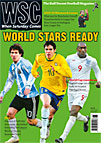 Inappropriate comments are hard to expunge from the social media archives. Paul Butler tells how the image of football fans can suffer as a result of such stupidity
Inappropriate comments are hard to expunge from the social media archives. Paul Butler tells how the image of football fans can suffer as a result of such stupidity
Footballers are constantly in the papers for their social media faux pas, but fans have transgressed too. In May, Norwich City fan Luke O’Donoughoe became the first supporter to be banned from a football ground for posting racist tweets, after commenting on news that the Canaries had signed former Evertonian James Vaughan. Not only was he banned for life, the police charged him with “sending an offensive message by public communication network under the Communications Act 2003”, and the 22-year-old was sentenced to a 12-month community order with 120 hours of unpaid work.

